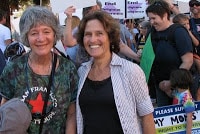Posts by Joan Price
Love Junkie: hot sex and ruinous relationships
Love Junkie by Rachel Resnick is a brave, compelling memoir/confessional of the author’s decades of seeking love and finding chaos and hot sex with damaged men within destructive, degrading, dangerous relationships. I couldn’t put this book down.
I’ve had my wild times in the past and made some bad choices, but I always loved my men caring and my sex gentle. Resnick made me hold my breath as she pummeled me verbally and emotionally with graphic tales of rough sex with damaged, controlling men — men who filled her vagina without ever filling her desperate need to be loved and valued.
Rachel Resnick grew up with a mother who was a drunk and picked up strangers in bars, her 11-year-old daughter drawing on paper placemats until mom was ready to go home, the man-of-the-night following in his own vehicle so he could make a quick escape the next morning. Her father had left when she was four.
As a child, she admitted her crush on a boy who responded by punching her in the stomach and hissing, “Don’t you ever come near me again, ever.” She took that painful contact as proof that he was destined to love her, and pursued him. So went the story of her adult dating life, too.
Resnick’s needy yearning (“a shadowy choke hold”) drove her life and relationships from one wrong man to another. She would do anything to please a man and make him love her — which of course drove him away or brought out the worst in him. She obsessively sent e-mail after e-mail to the man she craved: “If it took fifty e-mails of justifications and explanations, late-night drive-overs and I’m-sorry blow jobs, sign me up,” she writes about one such obsession.
Other reviewers have described Love Junkie as a train wreck — you know you should avert your eyes and keep going, but you can’t help staring at every bloody detail. I never felt like a voyeur reading it — I felt involved, a part of the story, wishing I could pull my friend Rachel away from her own need and the men who degraded her. I wanted to talk some sense into her, help her turn her life around, let her know that love is possible, but first she has to look inside and get help to repair the damage.
I’m relieved that she comes to this understanding herself, committing to a 12-step program for people who are out of control around sex and love. Love Junkie is riveting reading, highly recommended.
(photo of Rachel Resnick)
Ashes to the Wind
Yesterday would have been Robert’s 72nd birthday.
A year ago, we spent his birthday hiking the craggy Northern California coast which he loved, watching the waves crash over the rocks, holding each other as if we might never have this experience again.
Yesterday Robert’s family and I retraced those steps. The day was blustery and cold, the ocean silver green under grey skies instead of the sunlit blue it had been a year ago.
I sprinkled some of Robert’s ashes, and the wild wind sucked the ashes into the air in a dancing cloud. I did it over and over, my tears turning to laughter as each time the ashes took flight, like a magic trick, then disappeared into air.
“I am not easily repulsed”: interview with Mary Roach
 Mary Roach writes books on weird scientific research about subjects we’ve all wondered about. She is the author of Stiff: The Curious Lives of Human Cadavers, Spook: Science Tackles the Afterlife, and – her latest and my favorite – Bonk: The Curious Coupling of Science and Sex. I’ve long enjoyed Roach’s quirky style that often has me chortling as I read. Reading a whole book about my favorite topic (sex, not cadavers) was delicious.
Mary Roach writes books on weird scientific research about subjects we’ve all wondered about. She is the author of Stiff: The Curious Lives of Human Cadavers, Spook: Science Tackles the Afterlife, and – her latest and my favorite – Bonk: The Curious Coupling of Science and Sex. I’ve long enjoyed Roach’s quirky style that often has me chortling as I read. Reading a whole book about my favorite topic (sex, not cadavers) was delicious.
In a separate blog post, I’ve reviewed Bonk and quoted delightful tidbits that will send you running to read the book and give it to all your friends. Here with my interview with the author, Mary Roach:
JP: As cool-headed and sharp-witted as you are, some parts of your research must have embarrassed or repulsed you. What do you wish you had never done or learned, and why? Tell the truth!
MR: As readers of Stiff have probably figured out, I am not easily repulsed. At least not by the physical. I am repulsed by close-mindedness, petty hatred, greed, intolerance, ignorance. But not penises or vaginas or sex. But bear in mind, I was hanging out in sex labs, not fringe sex clubs South of Market. Honestly, it’s pretty tame stuff. Embarrassment-wise, well, there was the Dr. Deng scenario. Ed and I were scanned in 4-D ultrasound in the act. That was awkward, for sure, but I knew how much fun it was going to be to write it up, and so it hardly bothered me. Mostly, I felt guilty for dragging my husband into the fray.
JP: What have you seen or learned since you finished the book that you wish you could have included?
MR: Oh, people are always emailing me or coming up to me at talks and dropping all manner of irresistible tidbits that I wish I’d known about while working on the book. One man raised his hand and said, “Are you aware of the phenomenon of surfing sperm?” Apparently they surf the secretions on the vaginal walls. Another man, a gynecologist now in his seventies, emailed to tell me a story that William Masters had told him about meeting a bishop or cardinal, I forget which. His Holiness had asked to hear about the research Masters and Johnson were doing. He listened quite intently, and when Masters had finished speaking, he said, “Very good. Your work might serve to prevent a lot of divorces. Of course, if I am asked about it in public, I will condemn you.” Would have loved to include those!
JP: My blog is directed at older readers (most are 60-80) who are interested in sex. What did you learn specific to elder sex, aside from Viagra? If little or nothing, can you talk about why you think scientific research is NOT being done on elder sex, other than taking surveys? Is it the “ick factor,” as I call it?
MR: There was a large survey that was published not long ago about frequency of sex and satisfaction levels among people over 75, I think it was. The problem, as I recall it, was that so many of the women at that age were widows. I didn’t cover this because as you know it’s a book about laboratory-based sex research — the physiological stuff: arousal and orgasm and such. Rather than the behavioral issues. I cover the two physiological old-age biggies — erectile dysfunction in men and libido issues in women. I had wanted to include a chapter specifically on sex in the upper reaches of old age, but physiologically speaking, it seemed to be a matter of degree, rather than unique issues. In other words, more ED and lower libido… I don’t think of sex researchers as people who easily succumb to the ick factor — my god, look at Marcalee Sipski and her orgasm work with quadriplegics. If they were, they wouldn’t have gotten into arousal and orgasm research in the first place. Then again, I think old age is actually more of a taboo than sex these days, so perhaps it is the ick factor that keeps researchers away.
JP: What’s the most unusual experience you had while promoting this book? I imagine people came up to you and told you all sorts of things you’d rather not know.
MR: Call-in radio shows are always entertaining. The DJs will often bill me as a therapist or a researcher, and then open up the lines and say, “We’ll be taking ALL your questions on sex!” And I’m in the studio with this panicked look, mouthing NOOOOOO! Because I’m a writer — I only know about what I wrote about in the book. I don’t know, say, whether it’s a myth that the Hoo-ha tribe in the Amazon has blue testicles or what the best natural alternative to Viagra is. People do come up after readings and confide all manner of intimate things. It doesn’t bother me. I guess I’m used to it. I just wish I had better answers for them.
JP: What’s the next book (if you’ve decided)?
MR: Yes, I’m writing about the fabulous insanity of space travel, of staying alive in a world for which we are utterly ill-equipped. Lots of fun aeromedical history stuff, field trips to Moscow and the Japanese Space Agency, etc.
[Read my review of Mary Roach’s Bonk here.]
“Can I vote on your marriage?”
“Can I vote on your marriage?”
“Straight but not narrow”
“Give love a chance”
“Please let my Dads stay married”
“Marriage is defined by commitment, not genitalia”
These were a few of the signs carried by almost 2,000 people who marched yesterday in Santa Rosa, CA, part of an effort around the country to protest California’s passage of Proposition 8 banning gay marriage. Our own Sonoma County voted 66% against the proposition, but the state as a whole passed it.
Why was I there? I am committed to the belief that we should all be equal under the law — which seems so obvious that I am horrified, mystified, and embarrassed that Prop. 8 passed.
Beyond that, I had the profound and exhilarating experience of marrying— spiritually and legally — artist Robert Rice, the great love of my life. I know the depth, the joy, the emotional power of making that commitment.
Why deny the legal right to that same experience to committed couples who happen to be hardwired to love someone with the same genital configuration instead of the opposite?
I just don’t get it!
We marched yesterday, a rainbow of ages, colors, sexual orientations, united by one firm belief: equality under the law. Some walked nimbly, others were assisted by canes or crutches. Some pushed strollers, led dogs (often with their own signs or stickers), played instruments, or held hands. Many of the protesters were elders, I was happy to see, both gay and straight.
An amusing distraction was a man who carried a Bible and a sign that proclaimed, “God hates shrimp! (Leviticus)” In case you don’t know, the same book of the Old Testament that some people use to “prove” that God hates “sodomites” also includes this: “Whatsoever hath no fins nor scales in the waters, that shall be an abomination unto you.” In case you want to pursue this, visit the website devoted to this. (In case that makes you nervous, it’s a parody.)
I interviewed several elders about why they were there:
Liz Basile will be 81 next month. She left the Catholic church because of its positions on priest celibacy, abortion, and birth control. “I voted no on 8 because it’s just not fair,” she told me. “I’ve had two divorces – what did I do about the sanctity of marriage?”
Whitey Sterman, age 79, has two gay sons. “But I’d be here even if they weren’t gay,” he said.
“I think I’ll die still perplexed about why anyone cares what I do with my genitals,” Harley, a 68-year-old artist told me. Harley (who was a dear friend of Robert) is in a committed relationship with Hamlet Mateo, also an artist. “If I had waited for approval to be myself, I could never have lived my life.”
At a small group discussion afterwards, a grey-haired woman described the joy of being able to marry her partner of 15 years last October. Though she is dismayed that her marriage is no longer legally valid, she told us, “My marriage didn’t start last October, and it didn’t end on election day,”
I welcome comments on this and all my blog posts. If you’d like to comment but don’t know how, click here. It’s easy, really! If you have a website or a book related to the subject of this blog that you think we’d benefit from knowing about, feel free to include name and link. (No feeble excuses for blatent advertising, though, and no links to drugs or sites that I might consider questionable. If in doubt, ask me.)
Many thanks to Emily Evans for taking the photo above.
For more about this march, view a gallery of 17 photos by the Santa Rosa Press Democrat’s Kent Porter and read the Santa Rosa Press Democrat’s coverage of the march.

